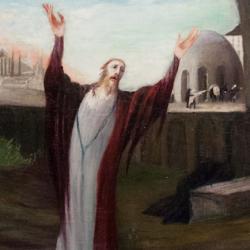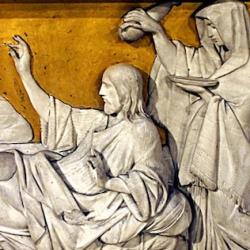Jesus says that in denying the resurrection the Sadducees are misunderstanding the Scripture. How so?
He’s saying, first of all, that they don’t even understand the Scripture they’ve quoted. Matthew makes this point very subtly. The quotation from Deuteronomy 25 says that the levirate brother is supposed to “raise up seed” for his dead brother. The verb is the verbal form of “resurrection,” the very same word that the Sadducees use in verse 28 in posing their conundrum, and Jesus uses in verses 30-31. The very passage they quote hints that the Scriptures aim as “raising up” a dead man, by “raising up” seed. The implicit point is: If God gave Israel a law that gave hope to a dying, childless man that he would have sons, that his name would live on, that he would have an heir, isn’t that a hint that God is a God of resurrection?
They also misunderstand some of the more fundamental passages of the Old Testament. Jesus goes back to a founding text of Israel’s history, Yahweh’s appearance to Moses at the burning bush. There, God describes Himself as the “God of Abraham, Isaac, and Jacob.” Jesus claims that God is not a God of graves and ghosts, but a God of the living, and if He is God of Abraham, Isaac, and Jacob in the time of Moses, then they must be alive. “Resurrection” in the first century meant “bodily resurrection,” but proving that Abraham was alive was sufficient to refute the Sadducees, who thought that a person simply passed from existence at death – no spiritual or bodily existence after death at all.
But there’s still more. With the question about the levirate still echoing in the background, Jesus reminds the Sadducees that they claim to serve the God of Abraham, the God who gave Abraham a son when he was as good as dead, the God who didn’t have to rely on the levirate institution or human procreation to continue Abraham’s seed, who literally, very literally, “raised up” a seed to Abraham from Abraham’s dead body and Sarah’s dead womb. In denying the resurrection, the Sadducees are denying their very confession, the confession that they were the children of Abraham.
Finally, the context of this quotation in Exodus 3 is important. This is Yahweh’s first revelation to Moses, in which He promises Moses that He’s heading down to Egypt to bring plagues on Pharaoh’s house and to release Israel. The God of Israel is a God who brings His people out of slavery, also the slavery of death. Jesus is also implicitly announcing His own new Exodus, when He will bring judgment on the “Pharaohs” of Israel and lead out a new people to His promised land.
But there’s a larger point here about the nature of God. What kind of God does Israel serve? Is He a God who binds Himself to Abraham, Isaac, and Jacob, but lets that bond go once death comes? Is He a God who shrinks back in fear at the grave? What kind of God is it who will go to mortals, say that He is binding Himself to them, but never deal with the greatest obstacle to their final happiness, death? Is He a God who is limited by the grave, whose faithfulness goes only so far and no further? Or, is He a God who is faithful unto death, and yet again faithful?











